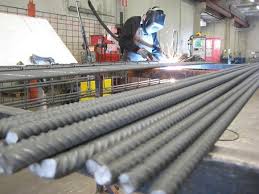 European steel industry is calling on EU ministers meeting today to work on an emergency plan of action for the sector. “To avoid imminent, irreparable damage to the EU steel industry, policy makers need to take immediate action, using the full set of available trade defence instruments, including speeding up the imposition of measures”, said the European Steel Association (EUROFER), in a letter to EU governments, signed by the executives of Europe’s steelmakers, including ArcelorMittal, Tata Steel, ThyssenKrupp Steel, SSAB, voestalpine, Riva, Celsa, and Salzgitter AG.
European steel industry is calling on EU ministers meeting today to work on an emergency plan of action for the sector. “To avoid imminent, irreparable damage to the EU steel industry, policy makers need to take immediate action, using the full set of available trade defence instruments, including speeding up the imposition of measures”, said the European Steel Association (EUROFER), in a letter to EU governments, signed by the executives of Europe’s steelmakers, including ArcelorMittal, Tata Steel, ThyssenKrupp Steel, SSAB, voestalpine, Riva, Celsa, and Salzgitter AG.
Imports at depressed prices, notably from China, but also from other countries such as Belarus, are surging into the EU market, hitting the steel industry and causing thousands of job losses. Driven by massive excess capacity – more than twice the size of total EU steel demand – China has been dumping unprecedented volumes of steel.
The steel sector has lost at least 85000 jobs since 2008, over 20% of its workforce. At least 5000 of these have come in the last quarter. “Europe needs to rapidly modernise its trade defence instruments. Presently, it can take a year and a half from complaint to definitive anti-dumping measure. This is too slow. Our trade partners can deploy trade defence tools faster and more effectively. The EU must also not abandon its economic, social and environmental principles in granting Market Economy Status to China before the country meets the EU’s criteria. In any case, the EU should conduct a full impact assessment and coordinate with its major trade partners before any such consideration can be undertaken,” stressed Robrecht Himpe, President of EUROFER.
“A strong and innovative steel sector is key to meeting the EU’s objectives for a prosperous, sustainable, resource-efficient and low-carbon European economy. For this to happen, the European steel industry needs nothing more urgently than a level playing field with its global competitors and a long-term perspective in Europe. This is a critical prerequisite for generating the revenues needed for investment,” concluded Mr Himpe.



